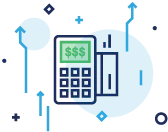TABLE OF CONTENTS
The complexities of payment processing can even baffle the most brainy bankers. Confusing terms and acronyms can clutter your business’s bank statement but signify crucial information. BTOT Dep, for example, indicates that your payment processor or acquiring bank has made withdrawals, deposits, or taken their fees. Understanding the BTOT Dep’s implications for your business will help you make informed decisions about your payment processing. Knowing the difference between BTOT and MTOT bank statements will guide you toward becoming a more well-rounded businessperson, regardless of your market.
What Is BTOT?

BTOT stands for “bankcard total” or “batch total” and is located on your daily statement when you close out your batch each day. It refers to the total amount of funds deposited or debited from your bank account for the day’s debit and credit card transactions. The total you see submitted into your account, however, may be different from your batch total. Why is that?
This is because your BTOT is a net amount. It represents the sum of all sales you made using debit or credit cards minus any returns or chargebacks for the day. For example, if you received a credit or a chargeback reversed in your favor, it will also get calculated into this total. Reconciling this deposit means you will need to account for all authorized transactions, refunds, and chargebacks. The BTOT is an important metric that helps you track the revenue generated through credit card sales.

BTOT Dep Meaning
Bankcard Total Deposit or Batch Total Deposit (BTOT) refers to transactions made on your account.
When a customer purchases using a credit card, the payment gets processed through your payment processor. The payment processor validates the transactions, verifies the funds are available in your customer’s bank account, and facilitates the movement of money once the batch gets submitted at the end of the night. You will see these funds deposited into your bank account between one and three days later.
A BTOT deposit denotes that you received a net positive amount for the day and is typically on your daily bank statement.

BTOT Adj Meaning
BTOT Adj typically refers to an adjustment to the Bankcard Total (BTOT) deposits.[1]Investopedia. “Bank Card: Overview, Features, Incentives.” Accessed on Dec 11, 2023. This might be a reversal, chargeback, error correction, or any unusual transaction. This is often a glitch and can be reconciled when you contact your payment processor for more information.
Bankcard USA and BTOT Dep
Bankcard USA and BTOT Dep should be recognized as two separate processing entities with little to no affiliation. Due to the similarities in their acronyms, there has been some confusion around billing and questions surrounding the term “BANKCARD BTOT DEP” on bank statements. Unless you have a specific merchant services relationship with Bankcard USA, BANKCARD BTOT DEP or BANKCARD BTOT DISC is not a deposit or charge from Bankcard USA.

What Other Processors Use BTOT Dep?
BTOT Dep is a very common term in the payment industry. Bankcard BTOT or MTOT is the statement descriptor for any payment processor using the FISERV/First Data network.
Depending on the network your payment processor uses, you may see different terms to describe the debits and credits. However, the underlying principle of depositing funds into your bank account remains consistent across various processors.
BTOT vs MTOT: Are They Related?
The BTOT vs MTOT debate always ends in an alliance as the two have more in common than contrast. If you see one on your statement, you probably see the other.
MTOT stands for “Monthly Total” or “Merchant Total.” It similarly may show as another variation like, “BANKCARD MTOT DISC,” “BANKCARD MTOT DEP,” “BANKCARD MTOT,” or “MTOT DISC BANKCARD,” (or potentially another similar variation).
Most commonly, you’ll see that this is simply the bank descriptor that denotes your payment processing fees for the month. To verify, compare the amount to your monthly statement from your payment processor.
For more information, we have a full article about MTOT Disc.
How to Manage BTOT Deposits

Managing BTOT deposits effectively will help you maintain a smooth cash flow for your operations. Here are a few considerations to help you optimize your BTOT deposits:
Payment processors control a large chunk of your cash flow: choose a processor with a proven track record of secure, reliable, and transparent fund deposit processes.
Some payment processors will hold your account or completely withhold your funds without notice, which is detrimental to operations. Look for processors with a secure and robust technology infrastructure, excellent customer support, and a transparent funding structure.
Monitor and Reconcile Deposits: Regularly review your bank statements and reconcile the deposits made to your account with the transactions processed. This helps you to quickly identify any discrepancies or potential issues.
Keep Track of Refunds and Chargebacks: Maintain accurate records of refunds and chargebacks initiated by customers. These can impact your BTOT deposits, and it’s important to track them to ensure proper accounting and financial management.
Optimize Settlement Times: Work with your payment processor to understand the settlement times for your transactions. Quicker settlement times can help improve cash flow and provide timely access to funds.
Seek Professional Assistance: If you find managing BTOT deposits challenging or time-consuming, consider consulting with a financial professional or an experienced merchant services provider. They can provide guidance tailored to your business’s needs and help streamline your payment processing operations.
How BTOT Dep May Differ for High-Risk Businesses
High-risk businesses are companies that are prone to chargebacks and elevated fraud risks. This liability makes it more difficult to manage BTOT deposits in high-risk merchant accounts than in low-risk operations. High-risk merchants often face stricter regulations, slower funding, and higher processing fees because of the increased potential for financial losses.
Payment processors and acquiring banks that work with high-risk businesses may implement additional safeguards and procedures to mitigate risk. These measures can include more thorough underwriting processes, reserves, and stricter monitoring of transactions. High-risk merchants need to partner with experienced payment processors for the unique challenges associated with their industry to ensure compliance and protect their business interests.
Closing Remarks on BTOT Dep
Bankcard BTOT Dep plays a crucial role in the payment processing ecosystem, ensuring merchants receive the funds from their credit card transactions accurately and efficiently. Understanding the meaning and implications of BTOT Dep is essential for merchants seeking cost-effective and operations-friendly credit card processing solutions.
It is crucial to work closely with your merchant service provider to assess your processing needs thoroughly, regardless of your business’s high or low-risk threshold. Factors such as your industry, risk assessment, and processing volume, and will help determine the most beneficial processing plan for your business.
By staying on top of your BTOT deposits, you can make well-informed decisions and optimize your payment processing, operations, cash flow, and overall business success.
Now is the time!
Take the next step and start accepting payments.
Ready?






